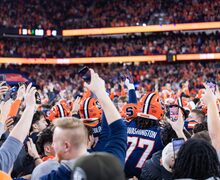Should college athletes be paid? Stephanie Miner and Jim Boeheim see it differently.
Colin Davy | Staff Photographer
Syracuse Mayor Stephanie Miner, in two tweets last week, called on the NCAA to pay student athletes.
With the college basketball world bracing for further fallout from the FBI’s corruption investigation into the sport, advocates for college athletes’ rights say the scandal is evidence that the NCAA should allow athletes to be compensated for their work.
In Syracuse, at least one prominent public figure agrees: Mayor Stephanie Miner.
Miner tweeted twice last week in support of college athletes being paid, calling on the NCAA to “stop the madness.” She said paying athletes would help “end the corruption and stop the exploitation.”
If we are going to end the corruption and stop the exploitation of young athletes, they should be paid. @NCAA #Fairness https://t.co/N0saV3Dden
— Stephanie Miner (@MayorMinerSYR) October 18, 2017
On Friday, Miner, who is nearing the end of her second and final term as mayor, will deliver a farewell address at SU, home to one of the country’s top college basketball programs. It will be Miner’s only farewell address.
It’s not clear what Miner’s next political move will be once she leaves office, but she has yet to rule out a run for governor of New York in 2018. Miner announced this week she will spend next spring teaching at New York University’s Robert F. Wagner Graduate School of Public Service as a “visiting distinguished urbanist.” In a press release announcing the appointment, Miner said she will use that role to “enhance my relationships and learn more about the issues impacting people across New York State.”
If she were to run for and be elected governor, Miner would have the means to take on the NCAA, experts say.
Miner was not made available for an interview for this story, but she told Spectrum News CNY last week the college athlete pay debate “is something that I have been following for a long time,” dating back to her years as a lawyer at the Syracuse-based law firm Blitman & King LLP.
“So I’ve looked at this issue about athletes as a labor lawyer and then as time has gone on we’ve just seen scandal after scandal,” she said.
The most recent of those scandals hit college basketball last month when, as part of an ongoing federal investigation, the Department of Justice announced the arrests of 10 people — including four Division I assistant and associate coaches — in connection to bribery and corruption schemes. In one of the schemes, an Adidas executive allegedly used cash bribes to steer high school players toward committing to universities sponsored by Adidas.
For critics who say college basketball needs reform, the scandal falls on the shoulders of the NCAA, whose rules prevent athletes from being paid or seeking legal, outside compensation including endorsements, sponsorships or even activities like signing autographs for cash.
“When you illegally price-fix a market, you create the black market. And that’s what we’re seeing in these FBI scandals,” said Ramogi Huma, a former football player at UCLA and executive director of the National College Players Association, which advocates for college athlete rights. “College athletes deserve equal freedoms as other students on campus, to receive what a marketplace would give them equally.”
Others see it differently, such as Syracuse head basketball coach Jim Boeheim, who himself makes more than $2 million in annual compensation.
At his media day press conference on Friday, Boeheim said the FBI scandal has “nothing to do” with whether players should be compensated, adding that similar issues could still happen if they were legally compensated. He also said that, of the athletes who would likely get endorsement deals under reform, many will move on to the NBA anyway and get endorsements there.
“There’s been movement to help student-athletes, in terms of getting resources that they didn’t have before,” Boeheim said, noting that athletes are eligible for cost-of-attendance stipends and need-based grants. “And I think all coaches, including me, have always been for them to get more resources — not to be compensated.”

Daily Orange File Photo
In a statement to The Daily Orange, Syracuse Director of Athletics John Wildhack said the education SU athletes receive, coupled with their diminished cost of attendance, provides them with “an incredible opportunity.”
“If they take advantage of it, they can leave Syracuse University well equipped to have success,” Wildhack said.
Michael Harper, a professor of law at Boston University who specializes in labor law, said he doesn’t see a future where athletes receive compensation beyond what they currently get.
“They’re supposed to be students,” he said. “That’s what they’re presented as, and this is an extracurricular activity. Once we give in all the way, where are you going to draw the line?”
Advocates, though, say a path to reform would be feasible and legal. But athletes first need a level playing field to negotiate, said Ellen Staurowsky, a professor of sport management at Drexel University.
Athletes and their advocates are currently facing opposition from entities such as the NCAA, which gets billions of dollars in revenue, and groups such as the LEAD1 Association, a coalition of Division I athletic directors with political influence. Tom McMillen, a former congressman with lobbying power, took over as president and CEO of LEAD1 in 2015. The group also moved its headquarters that year to Washington, D.C., “to allow for greater engagement with national policy makers,” according to the association’s website.
And while some lawsuits against the NCAA have ended with large settlements for athletes — such as O’Bannon v. NCAA, an antitrust lawsuit — none have forced the NCAA to significantly change its rules related to athlete amateurism.
To reverse that trend, athletes need a more influential voice in government and legal settings, which would require a labor union, Staurowsky said.
In August 2015, though, the National Labor Relations Board dismissed a petition by Northwestern University football players attempting to unionize. Additionally, in the wake of those players trying to unionize, states including Ohio and Michigan passed statutes specifying that college athletes can’t be considered employees, preventing them from forming unions.
But the opposite could also happen: Advocates noted that a state government could grant athletes increased rights, such as recognizing them as laborers and permitting them to unionize — though that would likely elicit pushback and a challenge from the NCAA.
Advocates for athletes’ rights say change will thus require more political actors to do what Miner did: publicly support reform.
Hey @NCAA – stop the madness, pay the athletes. https://t.co/TXnOil5M9S
— Stephanie Miner (@MayorMinerSYR) October 16, 2017
“Individuals like the mayor are very important to the discussion, and if they are working within state legislatures, they can exercise their platform in a variety of ways, for good or for evil,” Staurowsky said.
Miner, who represented unions during her years as a labor lawyer, will be out of office in just over two months. And, while it’s still unclear if she’ll make a bid for governor, it’s even less clear if she would ever consider using that platform to take on the NCAA.
But after seeing video of Miner’s comments on the issue last week, Huma, the director of the NCPA, was optimistic she could spark change.
“From what I saw, she seemed to have the will and wherewithal and possibly the intent to try to do something that would make a difference,” he said. “And that’s very encouraging and timely.”
Published on October 25, 2017 at 10:08 pm
Contact Michael: mdburk01@syr.edu





